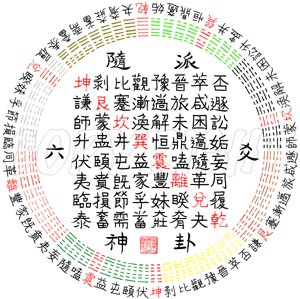
The Book of Changes, or Yi Jing (known in the West as I-Ching), is China's oldest philosophical text. Its origins are lost in the mists of time, but scholars believe the first compilation was done early in the Zhou Dynasty (1022 BC to 256 BC). Based on a divination system using the eight trigrams (groups of solid and broken lines), permutations of 64 pairs of trigrams were worked out. Over the ages short, memorable commentaries were added. For example:
Lü / Treading [Conduct]
Above CH'IEN THE CREATIVE, HEAVEN
Below TUI THE JOYOUS, LAKETREADING.
Treading upon the tail of the tiger. It does not bite the man. Success."
The Book of Changes charts the movements and developments (hence, 'changes') of all the phenomena in the universe. Many regard it as a complete system of philosophy in itself. Emperors, statesmen and generals throughout Chinese history consulted it.
Revered by Confucius, the Book of Changes was included in the five classic texts of Confucianism. It was one of the few books spared when Emperor Qin Shi Huang (259-210 B.C.) ordered the burning of previous dynasties' works. The Illustrated Book of Changes is a venerable classic made available to readers of modern Chinese and English. The 64 hexagrams and their traditional commentaries are explained with illustrations, and the Chinese text has been written by leading calligraphers.
These five classic texts have spawned not only Feng Shui, but Tai Chi, Chi-Gong, Acupuncture, and other philosophies and sciences.
The I Ching is one of the primary sources for the calculations of Feng Shui. If you look at a Chinese Luo Pan Compass, the I Ching characters appear to denote the Trigrams. The odd numbers are illustrated by white "sticks" and the even numbers by black "sticks".
For extensive background and detailed description of the I Ching, please see http://en.wikipedia.org/wiki/I_Ching
No comments:
Post a Comment